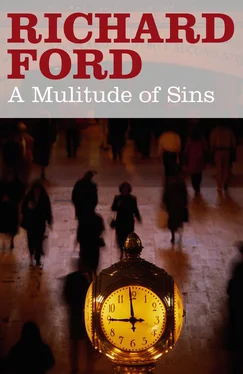“It’s nice here, isn’t it?” she said to make good company of herself. She’d taken off her anorak and tied it around her waist vacationer-style. The beer made her feel loose-limbed, satisfied. “Are we down-east yet?”
They were stopped in front of another realtor’s window. Tom was again bent over studying the rows of snapshots. The walk had also made her warm, but with her sweater off, the bay breeze produced a nice sunny chill.
Another Conant tour bus arrived at the stoplight in the tiny central intersection, red-and-white like the ones that had let off Japanese consumers last night at Bean’s. All the bus windows were tinted, and as it turned and began heaving up the hill back toward Route 1, she couldn’t tell if the passengers were Asians, though she assumed so. She remembered thinking that these people knew something she didn’t. What had it been? “Do you ever think about what the people in buses think when they look out their window and see you?” she said, watching the bus shudder through its gears up the hill toward a blue Ford agency sign.
“No,” Tom said, still peering in at the pictures of houses for sale.
“I just always want to say, ‘Hey, whatever you’re thinking about me, you’re wrong. I’m just as out of place as you are.’” She set her hands on her hips, enjoying the sensation of talking with no one listening. She felt isolated again, unapprehended — as if for this tiny second she had achieved yet another moment of getting on with things. It was a grand feeling insofar as it arose from no apparent stimulus, and no doubt would not last long. Though here it was. This beleaguered little town had provided one pleasant occasion. The great mistake would be to try to seize such a feeling and keep it forever. It was good just to know it was available at all. “Isn’t it odd,” she said, facing back toward the Penobscot, “to be seen, but to understand you’re being seen wrong. Does that mean …” She looked around at her husband.
“Does it mean what?” Tom had stood up and was watching her, as if she’d come under a spell. He put his hand on her shoulder and gently sought her.
“Does it mean you’re not inhabiting your real life?” She was just embroidering a mute sensation, doing what married people do.
“Not you,” Tom said. “Nobody would say that about you.”
Too bad, she thought, the tourist bus couldn’t come by when his arm was around her, a true married couple out for a summery walk on a sunny street. Most of that would be accurate.
“I’d like to inhabit mine more,” Tom said as though the thought made him sad.
“Well, you’re trying.” She patted his hand on her shoulder and smelled him warm and slightly sweaty. Familiar. Welcome.
“Let’s view the housing stock,” he said, looking over her head up the hill, where the residential streets led away under an old canopy of elms and maples, and the house fronts were white and substantial in the afternoon sun.
On the walk along the narrow, slant, leaf-shaded streets, Tom suddenly seemed to have things on his mind. He took long surveyor’s strides over the broken sidewalk slabs, as though organizing principles he’d formulated before today. His calves, which she admired, were hard and tanned, but the limp from being shot was more noticeable with his hands clasped behind him.
She liked the houses, most of them prettier and better-appointed than she’d expected — prettier than her and Tom’s nice blue Cape, the one she still lived in. Most were pleasant variations on standard Greek Revival concepts, but with green shutters and dressy, curved, two-step porches, an occasional widow’s walk, and sloping lawns featuring shagbark hickories, older maples, thick rhododendrons and manicured pachysandra beds. Not very different from the nice neighborhoods of eastern Maryland. She felt happy being on foot where normally you’d be in the car, she preferred it to arriving and leaving, which now seemed to promote misunderstandings and fractiousness of the sort they’d already experienced. She could appreciate these parts of a trip when you were there , and everything stopped moving and changing. She’d continued to feel flickers of the pleasing isolation she’d felt downtown. Though it wasn’t pure lonely isolation, since Tom was here; instead it was being alone with someone you knew and loved. That was ideal. That’s what marriage was.
Tom had now begun talking about “life-by-forecast”; the manner of leading life, he was saying, that made you pay attention to mistakes you’d made that hadn’t seemed like they were going to be mistakes before you made them, but that clearly were mistakes when viewed later. Sometimes very bad mistakes. “Life-by-forecast” meant that you tried very hard to feel, in advance, how you’d feel afterward. “You avoid the big calamities,” Tom said soberly. “It’s what you’re supposed to learn. It’s adulthood, I guess.”
He was talking, she understood, indirectly but not very subtly about Crystal-whatever-her-name-had-been. Too bad, she thought, that he worried about all that so much.
“But wouldn’t you miss some things you might like, doing it that way?” She was, of course, arguing in behalf of Tom fucking Crystal, in behalf of big calamities. Except it didn’t matter so much. She was at that moment more interested in imagining what this street, Noyes Street, would look like full in the teeth of winter. Everything white, a gale howling in off the bay, a deep freeze paralyzing all activity. Unthinkable in the late summer’s idyll. Now, though, was the time when people bought houses. Then was the time they regretted it.
“But when you think about other peoples’ lives,” Tom said as they walked, “don’t you always assume they’re making fewer mistakes than you are? Other people always seem to have a firmer grasp of things.”
“That’s an odd thing for a policeman to think. Aren’t you supposed to have a good grasp on rectitude?” This was quite a silly conversation, she thought, peering down Noyes Street in the direction of where she calculated she herself lived, hundreds of miles to the south, where she represented the law, defended the poor and friendless.
“I was never a very good policeman,” Tom said, stopping to stare up at a small, pristine Federalist mansion with Greek ornamental urns on both sides of its high white front door. The lawn, mowed that morning, smelled sweet. Lawn mower tracks still dented its carpet. A lone, male homeowner was standing inside watching them through a mullioned front window. Somewhere, on another street, a chain saw started then stopped, and then there was the sound of more than one metal hammer striking nails, and men’s voices in laughing conversation at rooftop level. Preparations were in full swing for a long winter.
“You just weren’t like all the other policemen,” Nancy said. “You were kinder. But I do not assume other people make fewer mistakes. The back of everybody’s sampler is always messier than the front. I accept both sides.”
The air smelled warm and rich, as if wood and grass and slate walls exuded a sweet, lazy-hours ether-mist. She wondered if Tom was getting around in his laborious way to some new divulgence, a new Crystal, or some unique unpleasantness that required the ruin of an almost perfect afternoon to perform its dire duty. She hoped for better. Though once you’d experienced such a divulgence, you didn’t fail to expect it again. But thinking about something was not the same as caring about it. That was one useful lesson she’d learned from practicing the law, one that allowed you to go home at night and sleep.
Tom suddenly started up walking again, having apparently decided not to continue the subject of other people’s better grip on the alternate sides of the sampler, which was fine.
Читать дальше












